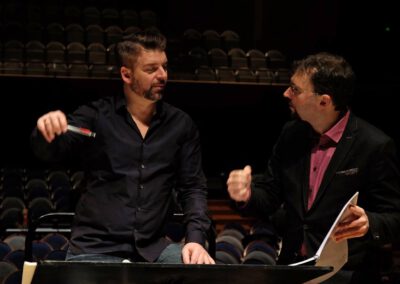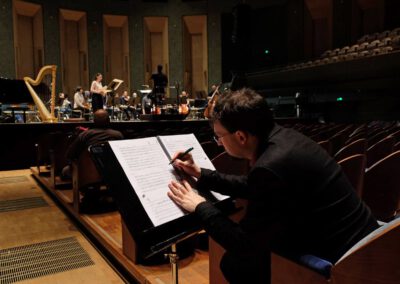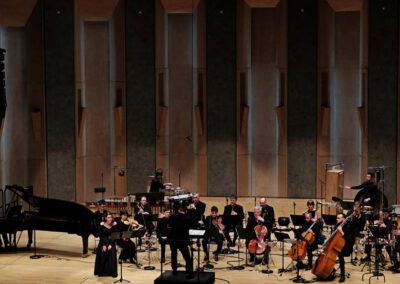UBUQUITY (2013/2018)
UBUQUITY (UBUQUITÉ, ÜBÜRALL – 2013/2018)
Farces for soprano and instrumental groups
Libretto by Alexander Stockinger
voice: S
ensemble: [1*.1.2*.1*/1.2.1.0/ 2perc/pno/1.1.1.2.1]
or [1*.1*.1*.1*.sax*/1.2*.1.0/ 2perc/pno*/cemb*/acc*/1.1.1.2.1]
duration: 20 min
première: November 21, 2013, hr-Sendesaal Frankfurt am Main, Germany
Ensemble Modern, Hélène Fauchère – soprano
Conducted by Brad Lubman
Commissioned by Ensemble Modern and supported by Hanne Darboven Stiftung and Kulturfonds Frankfurt RheinMain, within the “Cresc…” Biennial for modern music Frankfurt-Rhein-Main 2013
UBUQUITY-UP
(excerpt)
April 15, 2018, Royal Festival Hall, London
Philharmonia Orchestra, Nika Gorič – soprano, Conducted by Joana Mallwitz
Recording by the London Philharmonia Orchestra
Additional performances
February 1, 2014, Kölner Philharmonie, Germany
Ensemble Modern, Hélène Fauchère – soprano
Conducted by Beat Furrer
UBUQUITÉ
January 21, 2017, Philharmonie de Paris, France
Ensemble intercontemporain, Hélène Fauchère – soprano
Conducted by Matthias Pintscher
New version commissioned by Ensemble Intercontemporain, libretto translated to French by Bernard Banoun
UBUQUITY
April 15, 2018, Royal Festival Hall, London
Philharmonia Orchestra, Nika Gorič – soprano
Conducted by Joana Mallwitz
New version commissioned by Philharmonia Orchestra, libretto translated to English by Alwyn Tomas Westbrooke
VIDEO
January 21, 2017 at Philharmonie de Paris – Cité de la musique
Hélène Fauchère Brohier, soprano
Ensemble intercontemporain
Conducted by Matthias Pintscher
January 21, 2017 at Philharmonie de Paris – Cité de la musique
Hélène Fauchère Brohier, soprano
Ensemble intercontemporain
Conducted by Matthias Pintscher
ABOUT
UBUQUITY is a semi-theatrical work for ensemble and soprano, taking its inspiration the character of Ubu Roi from the proto-modernistic play by the French symbolist author and dramatist Alfred Jarry. A play on words, the original German title “Übürall” is a portmanteau word generated from “Ubu” + “überall”, the latter being the German word for “everywhere” or “ubiquitous” (an appropriate English translation would perhaps be “Ubuquitous”). The work is “compered” by the soprano, who represents the figure of Madame Ubu, commenting on five “basic human behavioural patterns” reminiscent of the seven deadly sins: self-pity, egomania, carnality, cowardice and brutality. The libretto is presented in a mishmash of languages, an affectation particularly in vogue in Germany’s contemporary avantgarde music theatre. Both text and music are sprinkled with quotations, a reference to the composer Bernd Alois Zimmermann’s highly-regarded work Musique pour les soupers du Roi Ubu, which is essentially a collage of quotations from works from the classical repertoire. In UBUQUITY, however, the quotations are more subtle and not integral to the overall form and texture of the work.
For UBUQUITY, the ensemble is distributed on stage and throughout the auditorium in such a way as to surround the audience, enabling the sound to rotate around the listener. Constructed from Žuraj’s trademark repertoire of gestures constructed from swarms of individual notes and percussive effects, UBUQUITY turns the concert hall into a refined and complex instrument in contrast to the uncouth brutality of the text. The pointillistic gestures of the individual ensembles merge in the auditorium to create the impression of a continuous sound that shifts its position and weighting from one part of the hall to another. Hearing individual notes from different directions enables the listener to perceive the lush, microtonal harmonies with added clarity and transparency.
Alwyn Tomas Westbrooke
UBUQUITY is a semi-theatrical work for ensemble and soprano, taking its inspiration the character of Ubu Roi from the proto-modernistic play by the French symbolist author and dramatist Alfred Jarry. A play on words, the original German title ÜBÜRALL is a portmanteau word generated from “Ubu” + “überall”, the latter being the German word for “everywhere” or “ubiquitous” (an appropriate English translation would perhaps be “Ubuquitous”). The work is “compered” by the soprano, who represents the figure of Madame Ubu, commenting on five “basic human behavioural patterns” reminiscent of the seven deadly sins: self-pity, egomania, carnality, cowardice and brutality. The libretto is presented in a mishmash of languages, an affectation particularly in vogue in Germany’s contemporary avant garde music theatre. Both text and music are sprinkled with quotations, a reference to the composer Bernd Alois Zimmermann’s highly-regarded work Musique pour les soupers du Roi Ubu, which is essentially a collage of quotations from works from the classical repertoire. In ÜBÜRALL, however, the quotations are more subtle and not integral to the overall form and texture of the work.
For UBUQUITY, the ensemble is distributed on stage and throughout the auditorium in such a way as to surround the audience, enabling the sound to rotate around the listener. Constructed from Žuraj’s trademark repertoire of gestures constructed from swarms of individual notes and percussive effects, ÜBÜRALL turns the concert hall into a refined and complex instrument in contrast to the uncouth brutality of the text. The pointillistic gestures of the individual ensembles merge in the auditorium to create the impression of a continuous sound that shifts its position and weighting from one part of the hall to another. Hearing individual notes from different directions enables the listener to perceive the lush, microtonal harmonies with added clarity and transparency.
Alwyn Tomas Westbrooke






